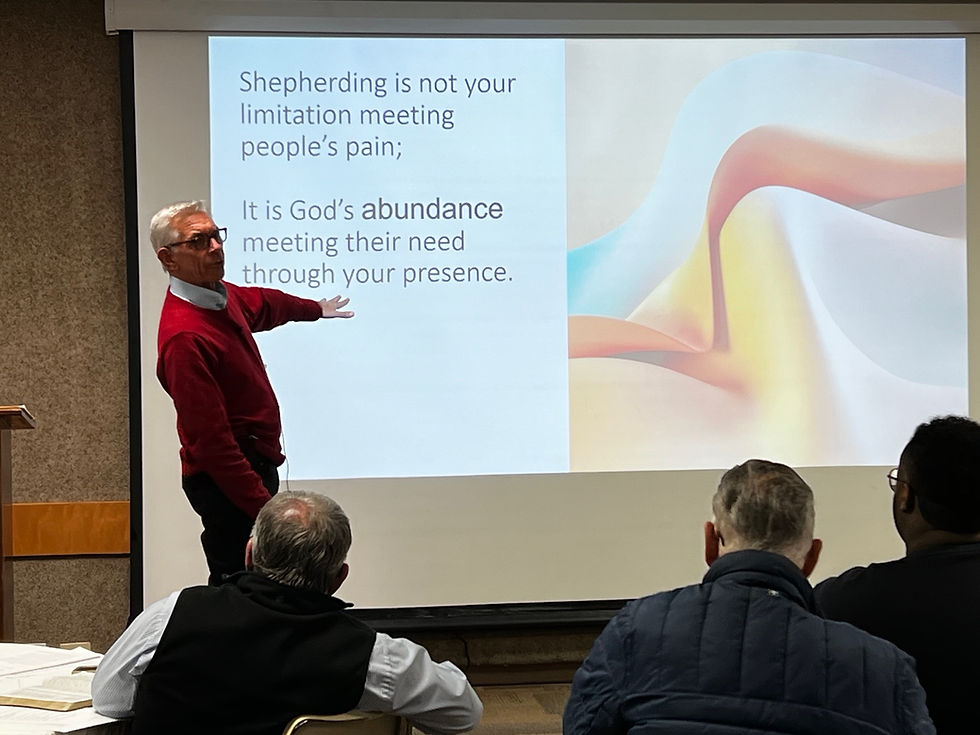Supporting the Future of Theological Education.
- Keith Stanglin

- Dec 26, 2023
- 3 min read

This year, my household downsized people. My wife and I became empty nesters. No, we haven’t yet moved to a smaller house; that seems impossible in the present market. But we could implement a few small changes. I’ll mention two.
Instead of using the dishwasher, we hand wash our dishes. Otherwise, it would now take days to fill up the dishwasher, and days-old dirty dishes don’t smell that great. Also, since our garbage output halved, we got a smaller trash receptacle to put out for collection. This little move cut our monthly garbage collection fee in half. There is no sense in wasting dishwasher space and garbage can space. Our new situation logically calls for some new behaviors.
Last year, Thom Rainer reported recent Lifeway Research on the size of American churches. By average worship attendance:

31% of all churches have under 50 in attendance;
37% of churches have 51 to 99;
24% have 100 to 249;
8% of churches have 250 and above in attendance.
This means that two-thirds of American churches have an average attendance of under 100, and the increasingly rare largest category has 250 or more in attendance, what Rainer calls the “new very large church.” This research confirms what I have always heard about Churches of Christ in particular—that the majority of congregations are comparatively small. These numerical realities in congregations are amplified by the recent closure or consolidation of so many seminary and theological training programs.
But what stood out to me was Rainer’s analysis that “the world of American congregations is dramatically different than just ten years ago.” He observes:
More pastors and staff will be co-vocational and bi-vocational.
Equipping church members to do the work of ministry is as vital as always.
Ministry and theological training must adapt to this reality.
Search committees will be looking for a different type of pastor.
Church budgets will be smaller.
Denominations must refocus their ministry and support of this new paradigm.
Such implications for the American church seem indisputable, and they confirm what the Center for Christian Studies has been all about from the beginning. It’s as if Rainer’s points were taken straight from our playbook. CCS equips the church and makes “quality scholarship available to the broader church.”
It’s Rainer’s final observation that I want to highlight, that “denominations must refocus their ministry and support of this new paradigm.” If I may extend his point, it would be irresponsible to pretend that things are the same and that numerical decline and cultural shifts shouldn’t change the way we equip churches and those who teach and lead churches. It would be like continuing to load the dishwasher unnecessarily or to use the wrong garbage can—business as usual.
On the contrary, wise and responsible Christians who see the tectonic shifts and understand the signs of the times have an obligation to do something about it, to make the necessary changes—to create or support organizations that are meeting the needs of today’s churches.
The Center for Christian Studies has already created an impressive catalogue of resources for all Christians and especially for smaller, under-resourced churches. But we cannot continue to expand it without the continuing support of generous donors and partner churches who have caught the vision for what the church can be and do in these challenging times.
Calling all wise and responsible Christians: Will you contribute a year-end, tax-deductible gift to help us fulfill our disciple-making mission? Will you partner with us in equipping churches and Christian leaders—here and around the world—with the highest quality resources? Consider giving—or continuing and expanding your gift—to the Center for Christian Studies.



Comments